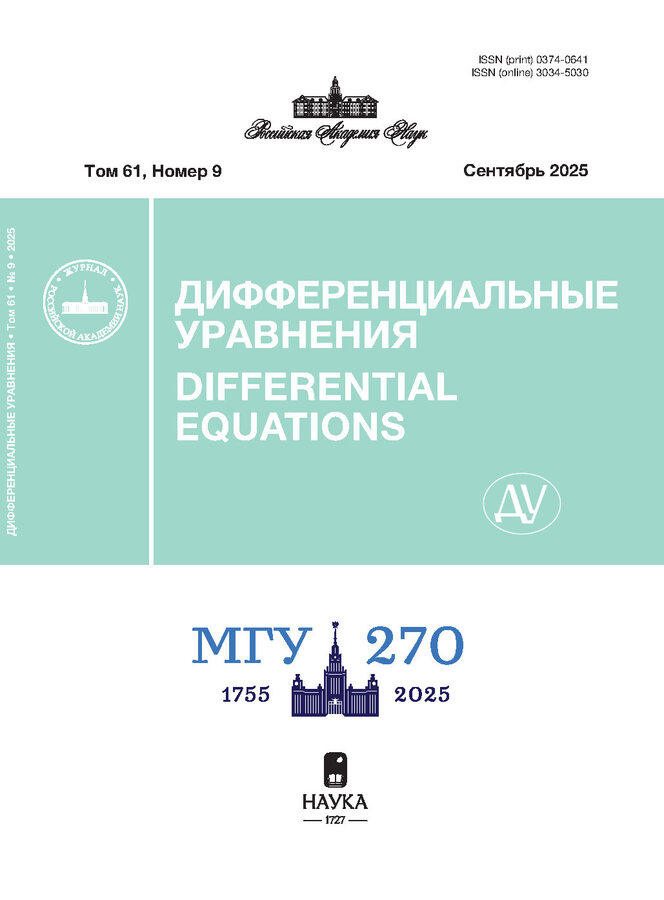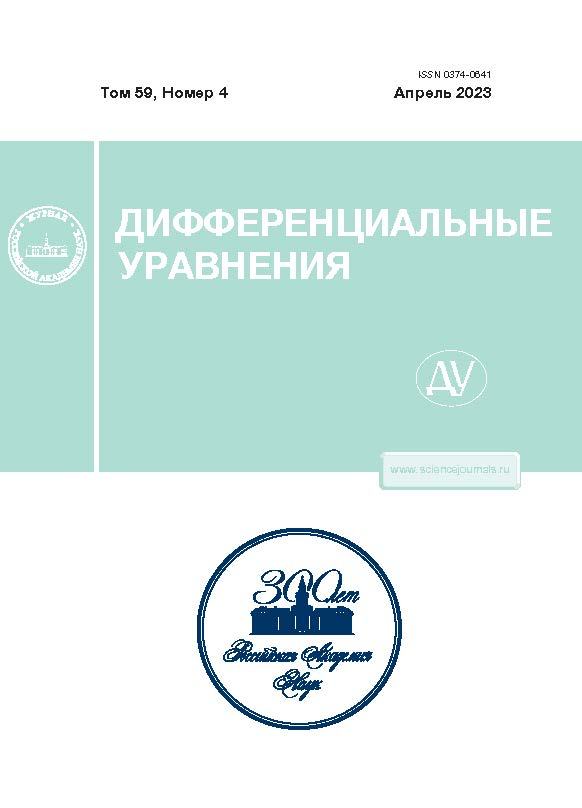Том 59, № 4 (2023)
Статьи
Об асимптотической устойчивости и предельной ограниченности решений одного класса нелинейных систем с запаздыванием
Аннотация
Для некоторого класса нелинейных систем дифференциальных уравнений с постоянным запаздыванием исследуются условия асимптотической устойчивости нулевого решения и предельной ограниченности решений. Для получения таких условий предлагаются специальные конструкции функционалов Ляпунова--Красовского полного типа. Находятся оценки времени переходных процессов и проводится анализ влияния возмущений на динамику систем. Кроме того, исследуется случай, когда в системах имеются переключения режимов функционирования, и определяются условия, при выполнении которых асимптотическая устойчивость или предельная ограниченность сохраняются при любых допустимых законах переключения.
 435-445
435-445


К исследованию робастной экспоненциальной устойчивости непрерывных и дискретных систем
Аннотация
Предложена методика получения достаточных условий робастной экспоненциальной устойчивости параметрически неопределённой системы. Данная методика применяется для исследования как непрерывных, так и дискретных параметрически неопределённых систем. Общая функция Ляпунова выбрана в виде положительно определённой квадратичной формы, которая является функцией Ляпунова для системы при конкретном значении параметра и удовлетворяет ограничениям на первую производную (первую разность). Применение предложенной методики проиллюстрировано на конкретных примерах.
 446-455
446-455


Обратная задача по определению неизвестного коэффициента уравнения колебания балки в бесконечной области
Аннотация
Для уравнения поперечных колебаний однородной балки рассматривается прямая начальная задача в бесконечной области, для неё изучается обратная задача по определению зависящего от времени коэффициента жёсткости балки. Приводится решение прямой задачи с помощью фундаментальных решений и доказываются существование и единственность этого решения. Получены оценки устойчивости для решения обратной задачи. С помощью принципа сжатых отображений Банаха доказаны теоремы существования и единственности решения обратной задачи.
 456-466
456-466


Спектральные свойства оператора в задаче о колебаниях смеси вязких сжимаемых жидкостей
Аннотация
Исследуется задача о нормальных колебаниях гомогенной смеси нескольких вязких сжимаемых жидкостей, заполняющей ограниченную область трёхмерного пространства с бесконечно гладкой границей. Доказано, что существенный спектр задачи представляет собой конечный набор отрезков, расположенных на действительной оси. Оставшийся спектр состоит из изолированных собственных значений конечной алгебраической кратности и расположен на действительной оси, за исключением, быть может, конечного числа комплексносопряжённых собственных значений. Спектр задачи содержит подпоследовательность собственных значений с предельной точкой в бесконечности и степенным асимптотическим распределением.
 467-482
467-482


Единственность решения задач Дирихле для уравнения Пуассона с сингулярным ∆B-оператором Киприянова
Аннотация
Функции, удовлетворяющие уравнению Лапласа для $\Delta_{B}$-оператора Киприянова, называются $K$-гармоническими. В работе приведены и доказаны следующие свойства $K$-гармонических функций: интегральное представление типа Грина $C^2$-функций, теорема о сферическом среднем, принцип максимума. В качестве следствия доказана единственность решения внутренней и внешней задач Дирихле.
 483-493
483-493


О некоторых свойствах решений систем линейных разностных уравнений с периодическими правыми частями
Аннотация
Рассматриваются однородная и неоднородная системы линейных разностных уравнений с коэффициентами, являющимися $N$-периодическими функциями дискретного времени. Для однородных систем получены достаточные условия существования периодических и почти периодических решений. Для неоднородных систем показано, что необходимым и достаточным условием существования $N$-периодического решения является наличие ограниченного решения. Установлены необходимые и достаточные условия ортогональности фундаментальной матрицы однородной системы. Приводятся иллюстрирующие примеры.
 494-500
494-500


Начально-краевая задача для течения жидкости с памятью в трёхмерной сетеподобной области
Аннотация
Рассматривается начально-краевая задача для интегро-дифференциальной системы, описывающей трёхмерное течение неньютоновской жидкости с памятью в сетеподобной области. При постановке задачи используются краевые условия Дирихле для поля скоростей и давления, а также условия трансмиссии типа Кирхгофа во внутренних узлах сети. Доказана теорема о существовании и единственности непрерывного по времени слабого решения. Кроме того, выведено энергетическое равенство, которому удовлетворяет это решение.
 501-511
501-511


Специальный вариант метода коллокации для одного класса интегро-дифференциальных уравнений
Аннотация
Исследовано линейное интегро-дифференциальное уравнение с особым дифференциальным оператором в главной части. Для отыскания его приближённого решения в пространстве обобщённых функций предложен и обоснован специальный вариант обобщённого метода коллокации.
 512-519
512-519


Об одном классе задач управления со смешанными ограничениями
Аннотация
Исследована задача оптимального управления с нерегулярным смешанным ограничением, линейным по переменной управления. Предложены необходимые условия оптимальности в форме принципа максимума Понтрягина для такого класса задач. Рассмотрены соответствующие примеры.
 520-530
520-530


Стабилизация дифференциально-разностной системы запаздывающего типа
Аннотация
Для линейной автономной дифференциально-разностной системы с соизмеримыми запаздываниями обоснованы алгоритмы построения регуляторов, обеспечивающих асимптотическую, финитную или полную стабилизацию данной системы. Отличительная черта предложенного подхода в том, что не требуется априорная информация о расположении корней характеристического квазиполинома исходной системы. Результаты проиллюстрированы примерами.
 531-553
531-553


Об устойчивости переключаемой аффинной системы для некоторого класса переключающих сигналов
Аннотация
Исследована задача об устойчивости нулевого положения равновесия переключаемой аффинной системы, замкнутой линейной статической обратной связью по состоянию. Введено понятие допустимого управления для заданного множества переключающих сигналов и получено конструктивное условие проверки указанного свойства для произвольной линейной обратной связи. Сформулировано достаточное условие устойчивости нулевого положения равновесия переключаемой аффинной системы, замкнутой допустимым управлением.
 554-562
554-562


 563-566
563-566













